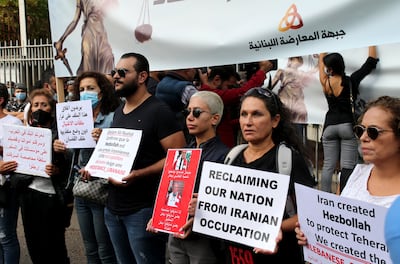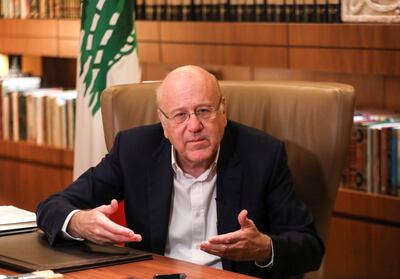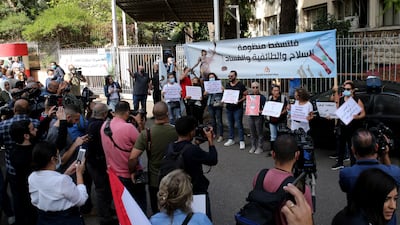One of Lebanon’s worst episodes of violence since the end of the civil war is unlikely to topple the government or even stoke wide-scale civil unrest, analysts have told The National.
Seven people were killed in fighting fuelled by rising tension over the Beirut blast probe.
The Iran-backed Hezbollah has accused its political rival, the Christian Lebanese Forces (LF) party, of firing at “peaceful demonstrators” who took to the streets last week to demand the dismissal of the judge leading the investigation into the port explosion.
The LF denies the accusations, arguing that fighting broke out between Hezbollah loyalists and residents after protesters stormed the area that separated Muslim and Christian neighbourhoods during Lebanon’s 15-year civil war.
Hezbollah leader Hassan Nasrallah gave a warning on Monday that the country was facing a “dangerous and critical new stage” while boasting that his party commanded a strong force of 100,000 fighters.
“Don't miscalculate. Sit quietly and get your act together,” Nasrallah said in a fiery speech, addressing LF chief Samir Geagea. But Mr Nasrallah said Hezbollah would not be lured into a domestic conflict.
His message, analysts say, is multifaceted.
“Hezbollah is saying 'we don’t want to be involved in a domestic conflict but we’re strong and ready',” Ibrahim Bayram, an expert in the party’s affairs, told The National.
That said, Hezbollah and its Shiite ally, the Amal movement led by parliamentary Speaker Nabih Berri, are unlikely to concede when it comes to replacing Judge Tarek Bitar, Mr Bayram said.
Nasrallah has accused Mr Bitar and the US of politicising the probe after the judge issued arrest warrants for former public works minister Youssef Finanous, a Hezbollah ally, and ex-finance minister Ali Hassan Khalil, a member of Mr Berri’s parliamentary bloc and the target of US sanctions.
Both Mr Hassan Khalil and Mr Finanous, along with ex-prime minister Hassan Diab and two former ministers, have snubbed Mr Bitar’s summons, arguing he had no constitutional authority to prosecute them.

Historic economic crisis
All five officials have been charged with criminal negligence in connection with the blast that killed more than 214 people and forced Mr Diab’s resignation, leaving the country without a functioning government for more than a year. The political vacuum accelerated Lebanon's financial meltdown, which the World Bank says ranks in the top three economic crises since the 1850s.
Mr Bayram said the latest tension over the probe was unlikely to topple the government of prime minister Najib Mikati given the country’s economic and financial woes.
“The risk of miscalculation, however, is real against the backdrop of tensions between Tehran and the US over Iran’s nuclear programme," he said.
Mr Mikati has yet to schedule a Cabinet meeting. Ministers affiliated with Hezbollah and Amal have threatened to boycott coming sessions if the Cabinet fails to block Mr Bitar from prosecuting senior officials. Hezbollah and its allies say political officials should be tried before a special body that comprises senior judges and politicians.

Mr Bayram said the Cabinet was unlikely to meet before a compromise deal was reached.
As of Tuesday morning, Mr Mikati had yet to decide on the timing of the Cabinet’s coming session, a source close to the prime minister told The National. Such a meeting would take place when political tension subsides, the source said.
Reforms stall
Though tension is likely to be wholly contained in the near future, the renewed political bickering deals a major blow for the government’s credibility and its commitment to enacting reforms, Mr Mohanad Hage Ali of the Carnegie Middle East Centre said.
The international community has been pressuring the government into enacting reforms in exchange for financial aid and demanding open elections in the spring, as well as an independent investigation in the port blast.
“The spotlight is now back on Hezbollah and its arsenal of weapons rather than the government’s reform programme and the investigation into the Beirut blast,” Mr Hage Ali said.
The confrontation was no longer between the ruling class and opposition groups but rather between Hezbollah and the LF, he said.
“It remains to be seen whether the LF gains from this confrontation by polarising Christian voters ahead of the upcoming elections,” he said.
Mr Bayram said continuing tension between the LF and Hezbollah was likely to weigh on President Michel Aoun, Hezbollah’s Christian ally.
Mr Aoun’s son-in-law Gebran Bassil, the leader of largest Christian parliamentary bloc and a staunch Hezbollah ally, has accused his Mr Geagea of stoking civil strife.


